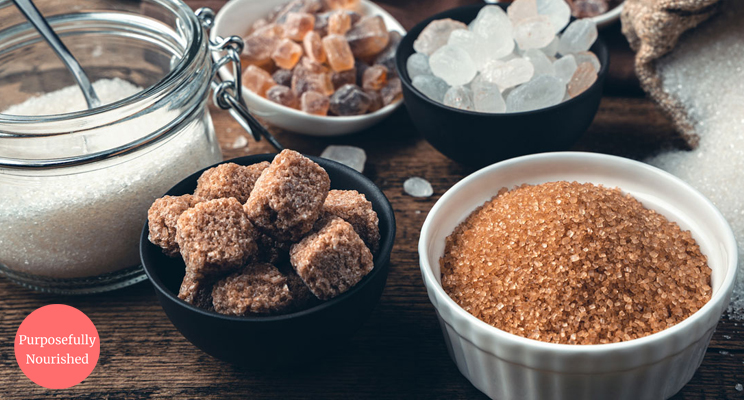Questions continue to be raised around the introduction of refined sugar to many of our foods and the role it plays in our overall well being. The focus on sugar in our diet has increased exponentially with many of us becoming aware of the negative health side-effects that the refined form has on our body. However, what’s challenging is avoiding foods containing this hidden killer.
How detrimental is refined sugar to your health and is the natural form any better? Keep reading to find out how to minimise your intake of refined sugar while understanding the importance of doing so. We talk about what they call themselves, what they really are and if it’s really that healthy to eliminate sugar altogether from your diet.
What You Need to Know About Refined Sugar
To maintain a healthy body, you need sugar in your diet. It gives your body the energy it needs to physically work while fueling your brain so you can function properly. Presenting in the form of glucose, it’s sourced from the sugar found in the food we eat.
Sugar is naturally found in many foods such as fruit and vegetables, nuts and seeds. These foods provide us with the nutrients needed to fuel and support our body, along with sugar. Refined sugar comes from a natural source such as cane, sugar beets and corn but it’s been heavily processed, losing its nutrients while becoming highly concentrated during refinement.
Eating food containing natural sugar supports your body’s healthy growth and development. However, choosing food that contains refined sugar has the opposite effect on your body, harming your health and resulting in illnesses. Conditions such as obesity, heart disease and type 2 diabetes are the result of overconsumption of refined sugar.
What Food Contains Refined Sugar?
One of the biggest culprits for containing high levels of refined sugar is packaged foods. Furthermore, these foods contain little to no nutrients, providing less than ideal nourishment for your body.
Food containing refined sugar can end up in your shopping trolley if you’re not aware of them. These include products such as:
- Cereals
- Crisps
- Canned food such as soups
- Salad dressings and sauces
- Chocolate bars
- Yoghurt (some brands have surprisingly high sugar content)
- Fruit juices
This list isn’t exhaustive and only highlights some of the common foods you may store in your kitchen pantry, oblivious of the hidden killer!

Refined Sugar: What They Call Themselves and What They Really Are
If you’re health-conscious and avidly read the food label on every item in the supermarket, you’re well aware of some strange-sounding names included in the list of ingredients! What’s worse, if you’re not familiar with the different labels given to refined sugar, you could convince yourself the food is sugar-free or only contains the natural form.
What They Call Themselves
Found naturally in plain milk, lactose loses its natural form when it’s added and undergoes the manufacturing process for beverages and packaged food. Other examples of names that may convince you that you’re eating the natural form are brown rice sugar and cane sugar.
These are sugars that have gone through the refinement process and are often added to food to boost their flavours. Here are some other alternative names used for refined sugar that’s hidden in the list of ingredients on food packaging:
- Blackstrap molasses
- Castor sugar
- Dextran
- Dextrose
- Fructose
- High fructose corn syrup
- Maltodextrin
- Palm sugar
- Sucrose
- Xylose sugar
Once again, this list isn’t exhaustive and it pays to do your research before buying a product containing ingredients you’ve never heard of before. Expect to find some form of refined sugar in foods such as protein shakes, alcohol, vinegar (masked under the name of caramel) and fresh juice.
What They Really Are
While derived from natural sugar, these products have gone through a refinement process, stripping them of their nutrients while resulting in an extremely sweet substance. While they give you a quick energy rush at the time of consumption, they can eventually cause your body to develop insulin resistance and diabetes.
Let’s take a look at one ingredient that’s often hidden in the list of ingredients for many packaged foods – high fructose corn syrup. Derived from corn, it’s extracted and made into corn starch before being processed into corn syrup. Enzymes are added to make it sweeter, increasing the fructose content.
High fructose corn syrup is used to increase the flavour of foods while acting as a preservative in products such as jellies and jams. It’s used as a fermenter in foods such as bread and pickles and to bulk up ice cream and soft drinks. Foods containing this type of sugar are high in calories, resulting in weight gain if over consumed.
What Are the Benefits of Removing Refined Sugars From Your Diet?
Removing refined sugars from your diet has many benefits including the following:
- Improved digestion and better gut health
- More clarity and focus and less brain fog
- Improved sleep and waking up feeling refreshed
- Better moods with reduced levels of anxiety and depression
- Healthy skin with fewer acne breakouts
- Improved weight management and less diet seesawing
- The overall sense of wellness
Eliminating foods that contain refined sugar from your diet gives you more energy and zest for life while reducing the risk of developing diseases such as diabetes.
Final Thoughts
Lurking in that list of ingredients on packaged food could be a hidden killer in the form of refined sugar. It’s not easy to spot unless you’re familiar with the different names used to label them. Kidding yourself into believing refined sugar is a natural product is a big mistake when it comes to your health.
By familiarising yourself with the different names, reading the food labels and choosing only to eat natural products you can avoid or reduce your intake of refined sugar. A quick tip! Look out for ingredients ending in -ose and avoid them at all costs! These are simply another form of refined sugar masked by another name to keep it hidden from your scrutiny!

